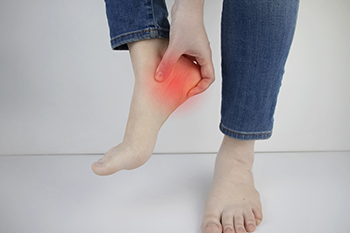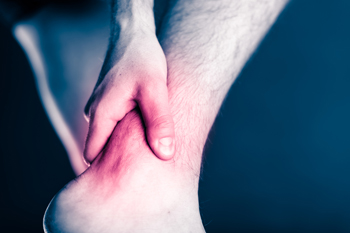Items filtered by date: September 2021
Can the Foods You Eat Affect Plantar Fasciitis?
Plantar Fasciitis is an inflammation of the band of tissue that connects your heel with your toes on the sole of your foot. Many people believe inflammation throughout the body can be reduced by making certain dietary adjustments—particularly by increasing the consumption of anti-inflammatory foods and decreasing consumption of inflammatory foods. Anti-inflammatory foods include green leafy vegetables, carrots, broccoli, strawberries, blueberries, tomatoes, legumes, nuts, lean meats, as well as tuna and salmon which are rich in omega-3 fatty acids. Inflammatory foods have high levels of sugar, including soft drinks, pastries and sweets, candy, processed foods, junk food, refined grains, as well as oils containing omega-6 fats (corn/soy/cottonseed oil), saturated fats and red meats. For more information on how to heal the pain and inflammation of plantar fasciitis, schedule an appointment with a podiatrist.
Plantar fasciitis is a common foot condition that is often caused by a strain injury. If you are experiencing heel pain or symptoms of plantar fasciitis, contact Dr. Joshua David Scoll from Pennsylvania. Our doctor can provide the care you need to keep you pain-free and on your feet.
What Is Plantar Fasciitis?
Plantar fasciitis is one of the most common causes of heel pain. The plantar fascia is a ligament that connects your heel to the front of your foot. When this ligament becomes inflamed, plantar fasciitis is the result. If you have plantar fasciitis you will have a stabbing pain that usually occurs with your first steps in the morning. As the day progresses and you walk around more, this pain will start to disappear, but it will return after long periods of standing or sitting.
What Causes Plantar Fasciitis?
- Excessive running
- Having high arches in your feet
- Other foot issues such as flat feet
- Pregnancy (due to the sudden weight gain)
- Being on your feet very often
There are some risk factors that may make you more likely to develop plantar fasciitis compared to others. The condition most commonly affects adults between the ages of 40 and 60. It also tends to affect people who are obese because the extra pounds result in extra stress being placed on the plantar fascia.
Prevention
- Take good care of your feet – Wear shoes that have good arch support and heel cushioning.
- Maintain a healthy weight
- If you are a runner, alternate running with other sports that won’t cause heel pain
There are a variety of treatment options available for plantar fasciitis along with the pain that accompanies it. Additionally, physical therapy is a very important component in the treatment process. It is important that you meet with your podiatrist to determine which treatment option is best for you.
If you have any questions, please feel free to contact one of our offices located in Philadelphia, Bensalem, and Fairless Hills, PA . We offer the newest diagnostic and treatment technologies for all your foot care needs.
What Can Cause Heel Pain?
 Heel pain can be debilitating for some patients, and can arise due to a variety of different causes. The three most common sources of heel pain are plantar fasciitis, Achilles tendonitis, and arthritis. Plantar fasciitis occurs when the plantar fascia, which is a band of tissue that runs along the bottom of the foot connecting the heel to the toes, becomes inflamed or torn. Achilles tendonitis is the result of the Achilles tendon, which connects the calf muscles to the heel bone, becoming inflamed. Other common causes of heel pain can include bursitis, stress fractures, or the wearing down of the heel pad at the bottom of the heel. If you are struggling with heel pain, consulting with a podiatrist for a proper diagnosis and treatment can be incredibly beneficial.
Heel pain can be debilitating for some patients, and can arise due to a variety of different causes. The three most common sources of heel pain are plantar fasciitis, Achilles tendonitis, and arthritis. Plantar fasciitis occurs when the plantar fascia, which is a band of tissue that runs along the bottom of the foot connecting the heel to the toes, becomes inflamed or torn. Achilles tendonitis is the result of the Achilles tendon, which connects the calf muscles to the heel bone, becoming inflamed. Other common causes of heel pain can include bursitis, stress fractures, or the wearing down of the heel pad at the bottom of the heel. If you are struggling with heel pain, consulting with a podiatrist for a proper diagnosis and treatment can be incredibly beneficial.
Many people suffer from bouts of heel pain. For more information, contact Dr. Joshua David Scoll of Pennsylvania. Our doctor can provide the care you need to keep you pain-free and on your feet.
Causes of Heel Pain
Heel pain is often associated with plantar fasciitis. The plantar fascia is a band of tissues that extends along the bottom of the foot. A rip or tear in this ligament can cause inflammation of the tissue.
Achilles tendonitis is another cause of heel pain. Inflammation of the Achilles tendon will cause pain from fractures and muscle tearing. Lack of flexibility is also another symptom.
Heel spurs are another cause of pain. When the tissues of the plantar fascia undergo a great deal of stress, it can lead to ligament separation from the heel bone, causing heel spurs.
Why Might Heel Pain Occur?
- Wearing ill-fitting shoes
- Wearing non-supportive shoes
- Weight change
- Excessive running
Treatments
Heel pain should be treated as soon as possible for immediate results. Keeping your feet in a stress-free environment will help. If you suffer from Achilles tendonitis or plantar fasciitis, applying ice will reduce the swelling. Stretching before an exercise like running will help the muscles. Using all these tips will help make heel pain a condition of the past.
If you have any questions please contact one of our offices located in Philadelphia, Bensalem, and Fairless Hills, PA . We offer the newest diagnostic and treatment technologies for all your foot and ankle needs.
Are You Suffering From Ingrown Toenails?
Sudden Ankle Pain May Be Due to Arthritis
If you suddenly experience ankle pain without any apparent reason or injury, it may have been brought on by some form of arthritis. For instance, osteoarthritis occurs when cartilage between bones wears down, causing them to rub together. This condition can sometimes cause sudden pain, often in the morning. Another type of arthritis—rheumatoid arthritis—causes your immune system to malfunction and attack healthy tissue. The lining in joints of the toes and ankles are a common location for rheumatoid arthritis to develop. A third type of arthritis that can affect your ankles is reactive arthritis. This occurs when a bacterial infection in another part of the body is responsible for generating arthritic symptoms like swelling and pain in your ankles. Gout is an arthritic condition caused by a build-up of uric acid in your body, which can crystallize on joints. Although gout typically affects the big toe, it can also develop in other joints, such as the ankle. Painful gout flare-ups are known to be intense and sudden, often occurring in the middle of the night. Pain of any kind in your ankles should prompt a visit to the podiatrist as soon as possible for an accurate diagnosis and treatment.
Ankle pain can be caused by a number of problems and may be potentially serious. If you have ankle pain, consult with Dr. Joshua David Scoll from Pennsylvania. Our doctor will assess your condition and provide you with quality foot and ankle treatment.
Ankle pain is any condition that causes pain in the ankle. Due to the fact that the ankle consists of tendons, muscles, bones, and ligaments, ankle pain can come from a number of different conditions.
Causes
The most common causes of ankle pain include:
- Types of arthritis (rheumatoid, osteoarthritis, and gout)
- Ankle sprains
- Broken ankles
- Achilles tendonitis
- Achilles tendon rupture
- Stress fractures
- Bursitis
- Tarsal tunnel syndrome
- Plantar fasciitis
Symptoms
Symptoms of ankle injury vary based upon the condition. Pain may include general pain and discomfort, swelling, aching, redness, bruising, burning or stabbing sensations, and/or loss of sensation.
Diagnosis
Due to the wide variety of potential causes of ankle pain, podiatrists will utilize a number of different methods to properly diagnose ankle pain. This can include asking for personal and family medical histories and of any recent injuries. Further diagnosis may include sensation tests, a physical examination, and potentially x-rays or other imaging tests.
Treatment
Just as the range of causes varies widely, so do treatments. Some more common treatments are rest, ice packs, keeping pressure off the foot, orthotics and braces, medication for inflammation and pain, and surgery.
If you have any questions, please feel free to contact one of our offices located in Philadelphia, Bensalem, and Fairless Hills, PA . We offer the newest diagnostic and treatment technologies for all your foot care needs.
An Overview of Foot Pain
Pain can occur anywhere in the foot, and its location may be an indicator of the underlying condition. For instance, heel pain is very common and may be due to plantar fasciitis, Achilles tendinitis, injuries, or bone spurs. Pain in either the 2nd, 3rd, or 4th toes may emanate from a muscle imbalance, which eventually causes the toe to become bent in a downward position (hammertoe). Pain in one of the toe joints, the ankle joint, or the joint connecting the toes with the forefoot may be a warning sign of arthritis. Ingrown toenails can cause pain in, and on top of, the big toe. If you feel pain in the ball of your foot, it may be due to Morton’s neuroma—a thickening of tissue surrounding an irritated nerve between the toes. Arches may be painful due to wearing unsupportive shoes, having plantar fasciitis, or if the arches have fallen. Swollen or generally painful feet may be due to pregnancy, the heat, diabetes, or poor blood circulation. If you feel pain in any part of your feet, have a podiatrist perform an examination to diagnose your condition.
Foot Pain
Foot pain can be extremely painful and debilitating. If you have a foot pain, consult with Dr. Joshua David Scoll from Pennsylvania. Our doctor will assess your condition and provide you with quality foot and ankle treatment.
Causes
Foot pain is a very broad condition that could be caused by one or more ailments. The most common include:
- Bunions
- Hammertoes
- Plantar Fasciitis
- Bone Spurs
- Corns
- Tarsal Tunnel Syndrome
- Ingrown Toenails
- Arthritis (such as Gout, Rheumatoid, and Osteoarthritis)
- Flat Feet
- Injury (from stress fractures, broken toe, foot, ankle, Achilles tendon ruptures, and sprains)
- And more
Diagnosis
To figure out the cause of foot pain, podiatrists utilize several different methods. This can range from simple visual inspections and sensation tests to X-rays and MRI scans. Prior medical history, family medical history, and any recent physical traumatic events will all be taken into consideration for a proper diagnosis.
Treatment
Treatment depends upon the cause of the foot pain. Whether it is resting, staying off the foot, or having surgery; podiatrists have a number of treatment options available for foot pain.
If you have any questions, please feel free to contact one of our offices located in Philadelphia, Bensalem, and Fairless Hills, PA . We offer the newest diagnostic and treatment technologies for all your foot care needs.




